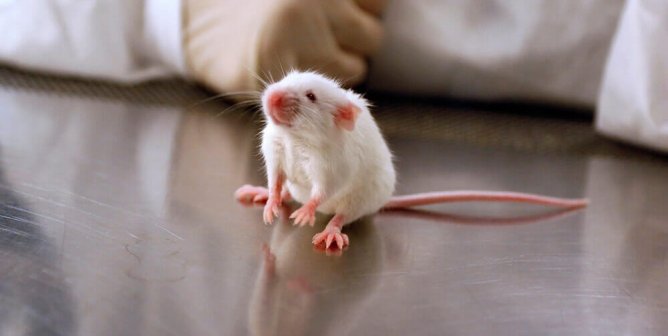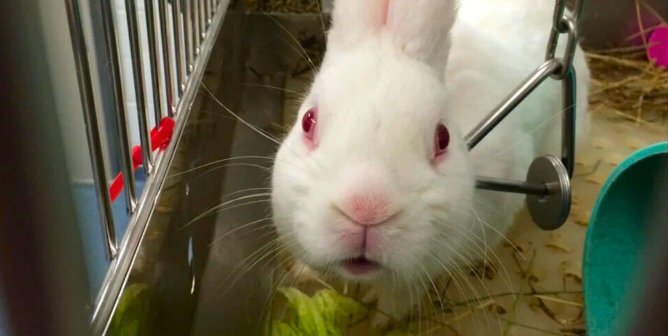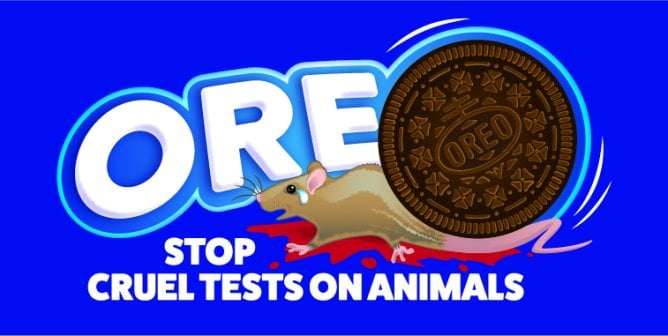Free-Range and Organic Meat, Eggs, and Dairy Products: Conning Consumers?
As people become more aware of the horrors of large factory farms where animals are imprisoned and slaughtered, companies are responding by labeling their products “all-natural,” “free-range,” “free-roaming,” or “organic.” But these labels are misleading. Most “free-range” animals are still mutilated and forced to endure long trips to slaughterhouses without any food or water. Moreover, they all have their lives violently cut short and are denied the opportunity to engage in anything that is natural and important to them.
‘Free-Range’
Companies want consumers to believe that products labeled “free-range” or “free-roaming” are derived from animals who spent their short lives outdoors, enjoying sunshine, fresh air, and the company of other animals. Labels—other than “organic”—on egg cartons are not subject to any government regulations, and the U.S. Department of Agriculture (USDA) does not regulate “free-range” or “free-roaming” claims for beef products.1
The USDA requires that “free-range” animals have access to outdoor areas, but there is no provision for how much time they must be allowed to spend outside or how much room they must be provided with to do so. The USDA’s regulations don’t require the birds to actually spend time outdoors, only to have access.2 Even if a farmer opened the door to a coop with thousands of birds inside and then closed it before any chickens went outside, they would still be able to use the “free-range” label.3
Because of genetic manipulation, even if an outdoor area is available, many chickens do not take advantage of the so-called “access.” One farm expert explains that chickens raised for meat in the U.S. are not bred for “mobility” but for “hogging down food” and adds that because they simply cannot walk, the birds rarely venture far from the feed trough.4 A study of approximately 800,000 chickens kept on free-range farms in the United Kingdom found that even though U.K. regulations require birds to have access to outdoor areas for at least eight hours a day, “the maximum number observed outside during daylight hours at any one time was less than 15% of the total flock.” The study stated that “chickens prefer ranging areas with trees [and] they avoid bright sun” and that “[a] wide open field is simply not a preferred habitat.” The researchers explained that domesticated chickens, much like their wild ancestors, need a habitat that provides shelter from wind, sun, and predators and that free-range operations should provide birds with more protection if they want to entice them to roam outside the barns.5
Regardless of what egg cartons may say, most hens raised for their eggs are subjected to cramped, filthy conditions until their egg production begins to wane—at about 2 years of age—and then they are slaughtered.6 Billions of “spent” hens are killed worldwide every year, their bodies destined for protein meal or pet food.7 When they are not being raised for their eggs or flesh, chickens can live for more than a decade.8 Male chicks are also victims: Every year, billions of male chicks are killed worldwide—usually in a high-speed grinder called a “macerator”—because they are worthless to the egg industry.9
‘Organic’
Meat, poultry, eggs, and dairy products labeled “organic” have been regulated by the USDA since 2002 and must come from animals who are “given no antibiotics or growth hormones.”10 Farms, processors, and distributors must be inspected by the USDA before they are allowed to use the “organic” label.
While food labelled “organic” might lower exposure to pesticides, a Stanford review of hundreds of studies comparing organics to conventional foods found they’re probably not much better for you than those foods without the label. “Some believe that organic food is always healthier and more nutritious,” said Dr. Crystal Smith-Spangler, who authored the review. “We were a little surprised that we didn’t find that.”11
The “organic” label is no guarantee of environmental friendliness either. Quite the opposite, according to Vasile Stanescu, a scholar at Mercer University, who says that these products are “the opposite of of sustainable. Despite what many people believe, ‘free-range,’ ‘pasture raised,’ etc. raised animals are significantly worse” in greenhouse-gas emissions.12
Other Labels Regulated by the USDA
None of the following labels addresses animals’ living conditions or their welfare during transport or slaughter:
• “Certified”: Meat that has been stamped with this label has been “evaluated” by the USDA “for class, grade, or other quality characteristics.”13
• “Natural”: Use of this label is permitted if the product contains “no artificial ingredient or added color and is only minimally processed.”14
• “No Hormones”: This label applies only to beef. Because hormones are not supposed to be given to pigs or chickens, pork and poultry products cannot legally be tagged with this label without the disclaimer “Federal regulations prohibit the use of hormones.”15
• “No Antibiotics”: This label can be used on beef and poultry products, provided that the producer supplies “sufficient documentation … that the animals were raised without antibiotics.”16
Industry-Sponsored Programs
The National Pork Board offers U.S. pork producers Pork Quality Assurance Plus (PQA Plus), a voluntary program “designed to help pig farmers and their employees continually improve production practices.”17 PQA Plus is not enforced and does not offer farmers any incentive for implementing its standards.
United Egg Producers (UEP) devised a scheme to use an “Animal Care Certified” label that was supposed to indicate that hens were treated humanely and inspected daily, but legal action forced UEP to remove this misleading label. Instead of treating hens better, the UEP has now begun using a new label that reads, “United Egg Producers Certified.”18 This program is also not regulated or enforced, and investigations have proved that companies using this label do not treat chickens any differently than conventional factory farms do.
The National Chicken Council has “Animal Welfare Guidelines” that Dr. Temple Grandin called “so lax that it allows plants or farms with really bad practices to pass.”19
What You Can Do
Because there are so many different labels with inconsistent definitions and regulations, it’s difficult to determine which products are the most “humane.” Because none of the labels applies to transport or slaughter and none prohibits bodily mutilations such as debeaking, tail-docking, ear-notching, or dehorning, the worst cruelty continues to be completely unregulated.
From the “free-range” hen who smells fresh air for the first time on her way to the slaughterhouse to the “humanely raised” cow whose male calf is taken away from her and sold to veal farmers, all animals who are raised for food suffer. The only truly humane option is to choose vegan alternatives to meat, eggs, and dairy products.
References
1Food Safety and Inspection Service, “Meat and Poultry Labeling Terms,” U.S. Department of Agriculture 10 Aug. 2015.
2James Hamblin “How to Read Eggs,” The Atlantic 10 May. 2017.
3Charles Stuart Platkin, “Basics of Meat Labels, Part II,” The York Dispatch 6 Sep. 2006.
4Judith Blake, “Pasteured Poultry: Advocates Say Both Chickens and Consumers Benefit With Free Range,” Seattle Times 26 Aug. 2003.
5Marian Stamp Dawkins et al., “What Makes Free-Range Broiler Chickens Range? In Situ Measurement of Habitat Preference,” Animal Behaviour 66 (2003): 151-60.
6M. M. Bain et al., “Increasing persistency in lay and stabilising egg quality in longer laying cycles. What are the challenges?” British Poultry Science 57(2016): 330-338.
7Chris Harris, “Finding The Value in Processing Spent Laying Hens,” The Poultry Site 20 Dec. 2019.
8“Raising Chickens 101: When Chickens Stop Laying Eggs,” The Old Farmer’s Almanac 7 Oct. 2020.
9 “France fails to end culling of male chicks,” AFP 1 Feb. 2023.
10AskUSDA, “How does the United States Department of Agriculture define the term organic?” U.S. Department of Agriculture, 19 Jan. 2024.
11Liz Neporent, “Organics Safer, No More Nutritious Than Conventional Foods,” ABC News, 2 Sept. 2012.
12Tim Johnson, “Livestock and Methane: What’s A Consumer To Do?” The Burlington Free Press 15 Jun 2014.
13Food Safety and Inspection Service.
14Food Safety and Inspection Service.
15Food Safety and Inspection Service.
16Food Safety and Inspection Service.
17National Pork Board, “PQA Plus Certification,” Porkcheckoff.org, accessed 28 Apr. 2024.
18Nelson Hernandez, “Egg Label Changed After Md. Group Complains: Federal Inquiry Into Advocates’ Charge of False Advertising Is Dropped,” The Washington Post 4 Oct. 2005.
19Joanna Rothkopf, “Perdue Forced To Remove ‘Humanely Raised’ Labels from Chicken,” Salon.com 13 Oct. 2014.








